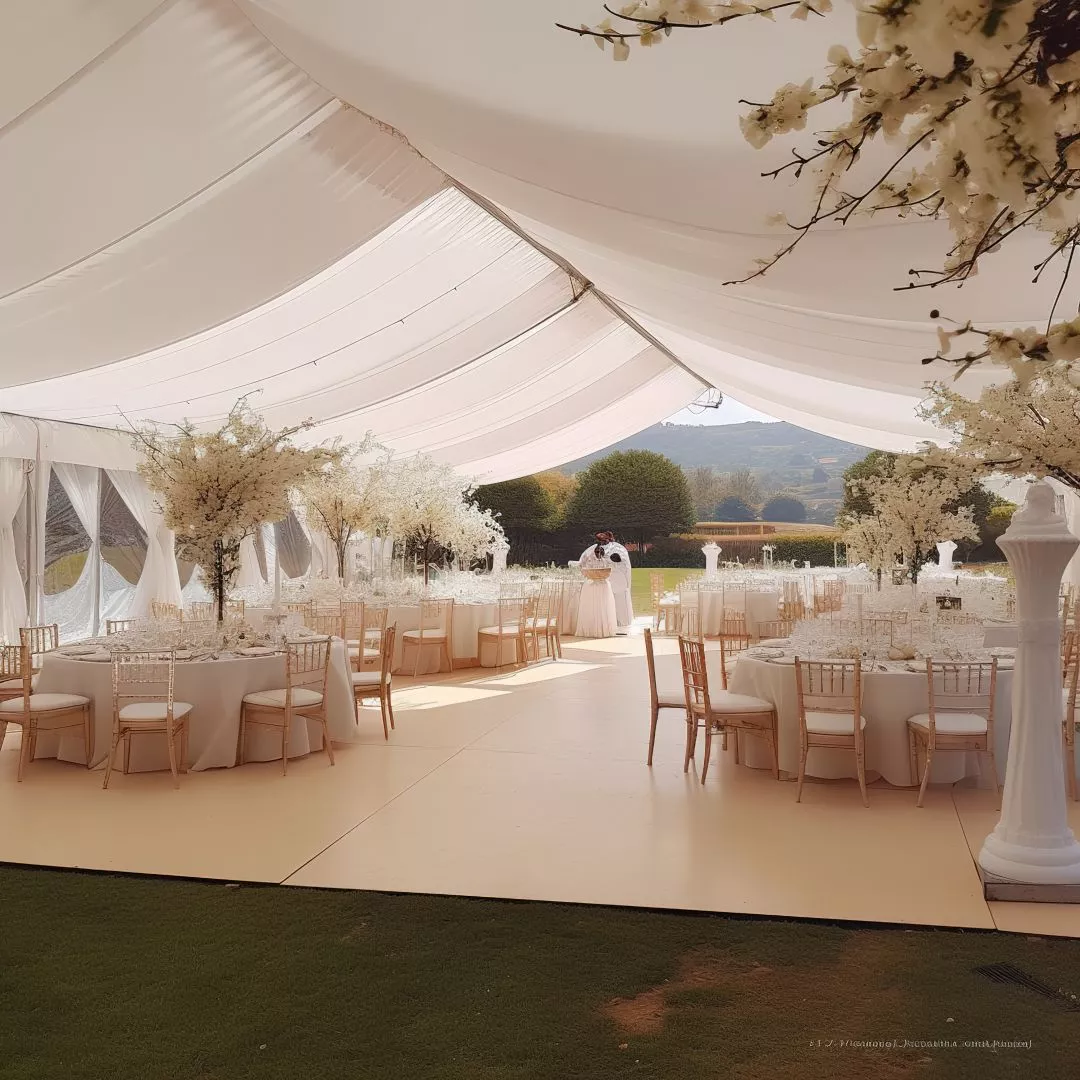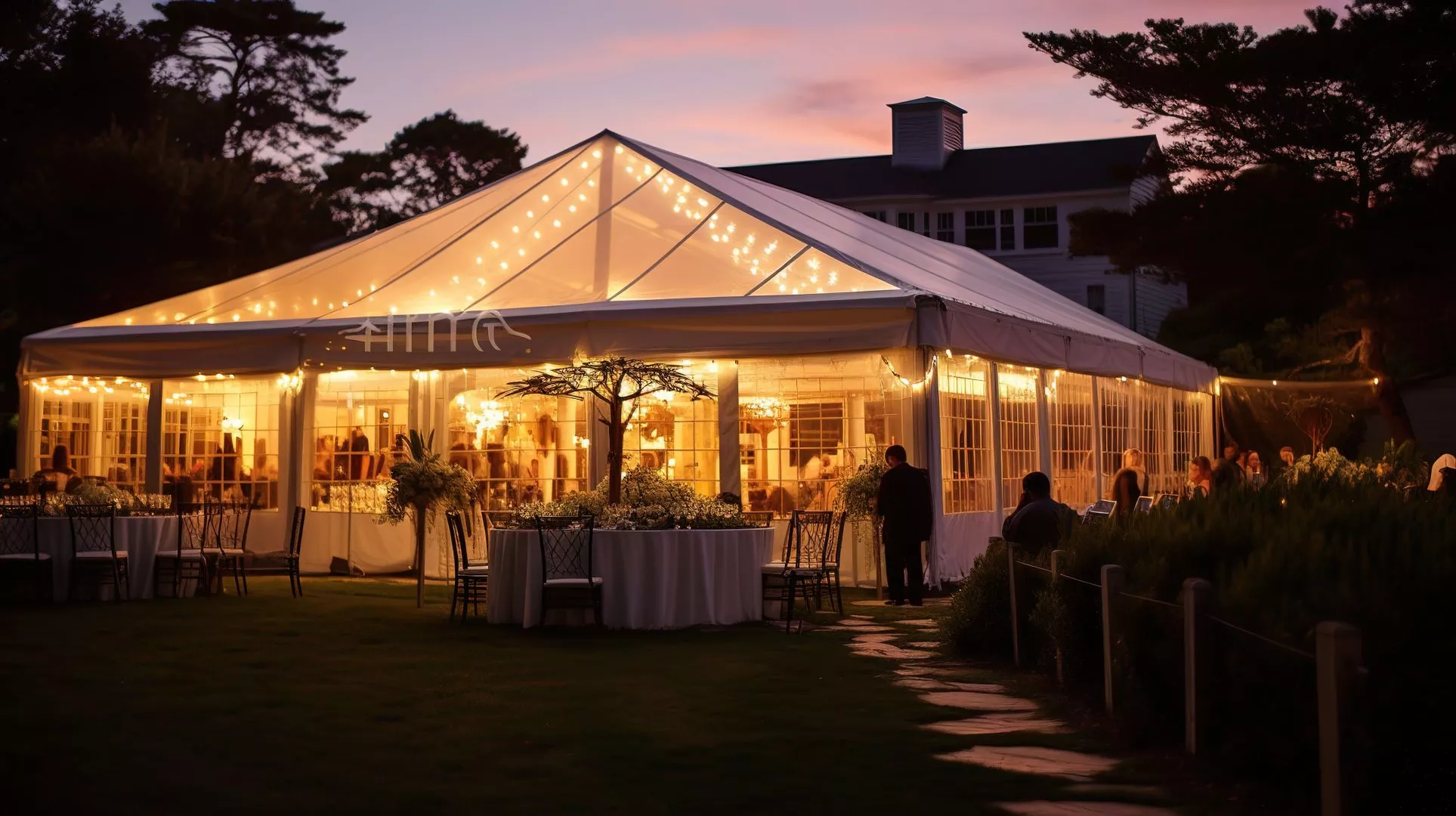Have you ben asking: What size generator is needed for a wedding marquee? Ensure your special day is powered flawlessly with the right generator capacity. Learn how to calculate your power needs efficiently and make your wedding celebration unforgettable.
Main Marquee Power
Planning a wedding marquee involves numerous considerations, one of which is figuring out - what size generator is needed for a wedding marquee. The answer to this vital question largely depends on an understanding of your marquee’s energy needs. The generator size needed for a wedding marquee is influenced by several factors, including lighting, heating, and audio-visual equipment. All these elements are critical to the success of your event. Lighting is an essential feature of any marquee. Typically, each lightbulb will consume between 5 to 10 watts of power.
So, if you plan to use a hundred lights, you would require a generator capable of producing 500 to 1,000 watts. Furthermore, heating provisions, particularly crucial in colder weather, can require anywhere between 1.5kW to 3kW of energy, depending on the size of the marquee.
Additionally, there's the power needed for audio-visual equipment such as speaker or projector systems, which can range from 300 watts to 1,000 watts. Adding up these figures will give you an approximation of the overall power needs for your marquee. It's important to remember that these estimates may vary according to your individual situation. It's generally considered good practice to hire a generator that's a size larger than your total calculations, leaving room for unexpected power requirements.
Catering Power
At an event such as a wedding held in a marquee, one of the significant power consumers is usually the caterer's equipment. Given that these events frequently take place outdoors, caterers require power for an array of necessities.
These include cooking, refrigeration, and in many cases, operating coffee and tea urns. The energy required to cater for the guests largely depends on the number of guests attending and the planned menu.
Starting with the necessities for guest’s food preparation, a domestic oven, which is often used, typically requires about 2kW of power. In contrast, a commercial oven with six burners, particularly necessary for larger gatherings, might need as much as 12kW.

Fridges and freezers, indispensable in any catering set-up for keeping food and beverages fresh, need power levels varying between 200 watts and 1kW each. What this means is that the overall power necessary for the catering team can accumulate quite swiftly.
Hence, it is vital that your caterers supply an accurate list of the equipment they will need to operate their services. Detailed knowledge of the power requirement is crucial so that you can provide ample electricity for the event. An essential factor to consider when organising your event is to decide what size generator is needed to meet these power requirements.
Remember, catering often demands the most power at events, so the generator must be chosen accordingly. Be cautious to take into account all key considerations, including the power demands of not only the caterer's equipment but also the total power required for your event.
In most scenarios, the best course of action is to consult professionals. This is often firms that specialise in generator hire. These experts possess the knowledge and experience to provide you with advice on the most appropriate generator size that would suffice the power needs of your event's catering department. The correct generator size ensures the smooth running of the event, leaving you and your guests happy.
Band Power
The power needs of your marquee will be heavily influenced by the form of entertainment you've chosen. Namely, the power consumption of a band or DJ can vary significantly, impacting the size of the generator required to meet these demands. A DJ, for example, typically utilises a small PA system, which could take anything from 400 watts up to 1,000 watts. Should you choose this type of entertainment, the overall power needs for your marquee will likely fall within this range.
On the other hand, if you plan to have a band to provide music, the power demands can increase rapidly. Given that many music groups carry their own audio equipment, their power consumption may exceed a few thousand watts, often venturing into several kilowatt zones.
Therefore, it's crucial to connect with your chosen musical talent beforehand to acquire all necessary information about their power demands. Once you've obtained this detail, you can then decide on the adequate size generator you should hire for your event. After all, ensuring that all elements within your marquee are sufficiently powered is key to hosting a successful event.
So, it's important not to overlook this aspect of your planning - it may be the difference between a good party and a great one. Remember, whether you are dealing with the soft beats of a DJ, the rock vibes of a live band, or anything in between, knowing their power requirements is fundamental to guaranteeing a seamless and uninterrupted entertainment experience for your guests.
Outside Lighting Power
Outside lighting is frequently overlooked when planning the power needs for an event, yet it's an essential component for any outdoor gathering. It's especially significant when you're hosting an event in locations where natural light is minimal.
Not only does outdoor lighting aid in guiding guests from the parking area to the marquee, but it also creates a welcoming atmosphere and ensures everyone's safety.
Think of your event in the evening. Lighting is not just decorative but practical. It illuminates your space, providing visibility and enhancing the ambience.

Whether it's a string of fairy lights or elegant lanterns, the right lighting can dramatically transform your venue from ordinary to extraordinary, turning your wedding marquee into a wonderland of lights.
However, all these lights require power. Let's consider an example. If you have 20 outside lights and each one uses 50 watts, that totals around 1,000 watts. So, it's clear that external lighting can be a significant power consumer at your event.
As such, it's important that you don't overlook the power needs of your outdoor lighting when calculating the size of the generator for your wedding marquee. In conclusion, always factor in the power requirement of your outdoor lights in your planning. That way, you can ensure the success and magic of your event, leaving guests with a memorable experience, filled with light and delight.
Other Unknown Items
When planning an event, it’s essential to consider all the elements that will require a power supply. The main marquee often requires a significant amount of power, as do the catering provisions and the input necessary for the band's audio and visual needs. Outside lighting for safe navigation and aesthetic appeal in the evening also requires a notable amount of power. Each one of these elements forms a crucial part of your event's success, creating a lively and welcoming atmosphere for everybody involved.
However, beyond these primary power considerations, there's a whole host of other items that may also need power. These could be various miscellaneous items which, though not immediately obvious, play a crucial part in enhancing the overall experience of the attendees. For instance, a photo booth - typically a hugely popular feature at events - certainly needs a steady supply of energy.
Additionally, electric water coolers serve as an essential means of keeping guests comfortable and hydrated throughout the day. Extra detail needs to be paid to the foresight of having "just-in-case" power on standby. This serves as a backup for any equipment or requirements that suddenly crop up on the day. It's not uncommon for unforeseen requirements to arise at the last minute, so having an additional power supply set aside ahead of time can act as a lifesaver for ensuring that the event runs smoothly.
Furthermore, the vendors and suppliers involved in setting up the event may also bring along their own equipment or facilities that require power. Even if not originally accounted for, these can unexpectedly add to the overall power demands. So a conversation with your suppliers about their power requirements can prove beneficial for avoiding any unpleasant surprises on the big day.
In summary, planning for power usage in an event involves much more than meets the eye. Beyond the obvious requirements, numerous other elements need careful consideration. By planning thoroughly and thinking about every single detail, you can ensure you have enough power to accommodate all aspects of your event seamlessly and efficiently.
Power on Rent deliver generator hire throughout Gloucestershire. Find out more about our event generator hire services.

